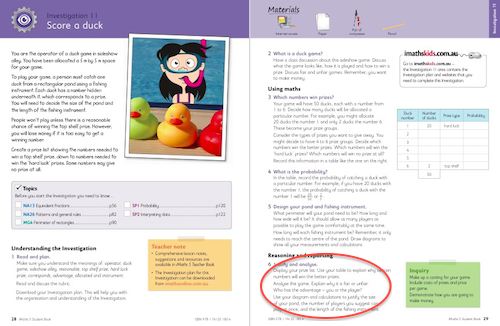Articles & Videos
Focus on reasoning
Categories
Subscribe to our newsletters
Receive teaching resources and tips, exclusive special offers, useful product information and more!
Back to Assessment articles & videos
Focus on reasoning
iMaths 18/10/13

Note: iMaths is in its final year and will be discontinued at the end of 2024. If you’re looking for a primary maths resource written for the Australian Curriculum Version 9.0, explore Maths Trek.
As every teacher knows, teaching the proficiency strands of the Australian Curriculum are equally as important as teaching the content.
One of the benefits of introducing iMaths Investigations to your classroom is that you get to comprehensively cover all of the proficiency strands, including the trickier Reasoning strand.
The good news for teachers is that iMaths Investigations are structured to provide everything you need to ensure your students develop their reasoning skills. By choosing to teach Investigations, you’ll be surprised to discover how easy it is to set up opportunities for students to explain their thinking, and how easy it is to assess their reasoning.
When do my students apply higher order thinking skills?
While students may apply higher order thinking skills throughout an Investigation, each Investigation includes a dedicated final step called ‘Reasoning and reporting’. Once students have worked through the required elements of an Investigation to produce results, students should follow this final step to interpret their findings. This encourages students to justify their answers by giving a reason, and not just an answer.
For example, let’s take a look at Investigation 11 Score a Duck in iMaths 5.

The instructions from the Student Book are as follows:
Display your prize list. Use your table to explain why certain numbers will win the better prizes. Analyse the game. Explain why it is fair or unfair. Who has the advantage – you or the player? Use your diagram and calculations to justify the size of your pond, the number of players you suggest can play at once, and the length of the fishing instrument.
The key reasoning words in the final step of this Investigation are explain, analyse and justify. Remind students to focus on these key words since these indicate to students which mathematical solutions they are required to evaluate. You may want to remind students to refer to the Investigation Rubric as this outlines the proficiency strand criteria that you will assess their ability against.
How do I know if my students are applying higher order thinking skills?
Use the Communicating and reflecting questions in the Investigation Teaching Plan at iMaths Online to discover whether students can justify their answers and to help you assess their proficiency in reasoning.
For example, in Investigation 11 you might ask students the following:
- Would it be a fair game for the player if one half of the ducks won no prize at all?
- How did you decide how many players would be able to play your game at once?
- How did you calculate the length of your fishing instruments?
We’ve covered the Reasoning strand so now all you have to do is vary your teaching and use iMaths Investigations to help your students build and develop their reasoning skills. Investigations have the potential to support amazing learning. Organise your students into groups, set your expectations, and watch them interpret and justify their results.